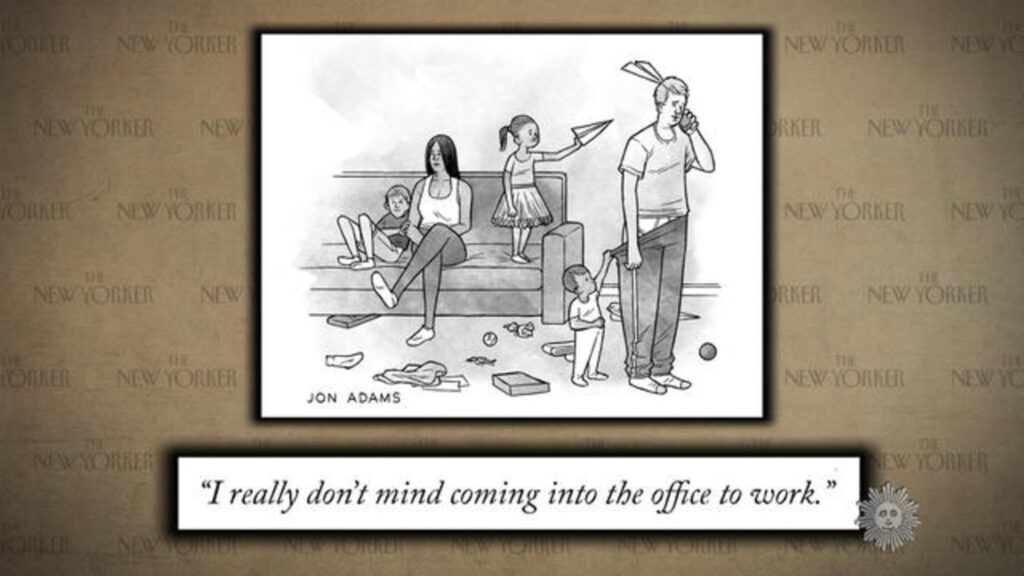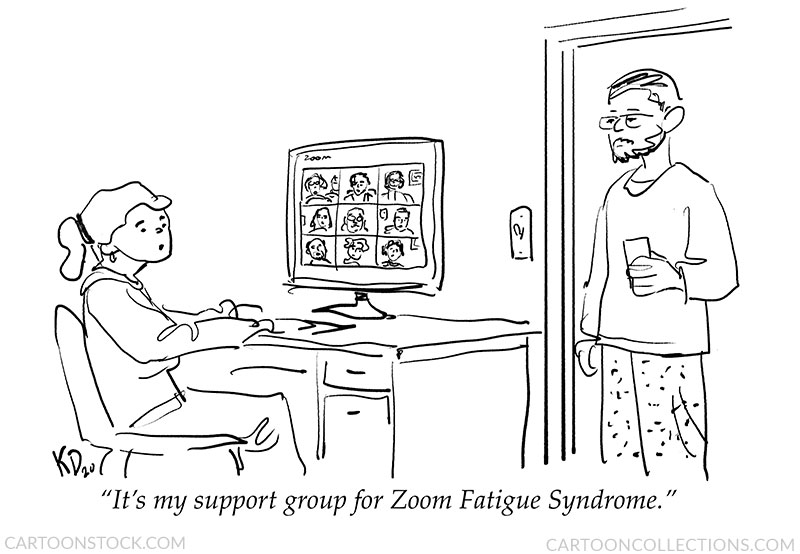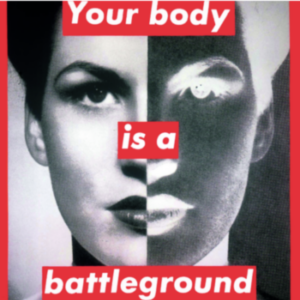After reading the Cuboniks piece, I was reminded of an article in the New York Times that explained how everyone suffered from Zoom fatigue during the pandemic, but women are feeling the technological effects worse. I chose two New Yorker cartoons that sum up some of these emotions:


The scrutiny of being a woman working in an office haven’t gone away—they have just been shifted to a new digital setting. In a year that brought us all to our emotional and mental breaking points, that same pressure to be perfect still exists, but this time online and ALL the time.
The Times article mentions “mirror anxiety”, which is when seeing yourself in a mirror (for 8 hours a day) triggers heightened self-focus. This leads to anxiety and depression, and women were surveyed as feeling these stronger than men. Adding this on top of demanding duties caring for the home and loved ones (but it’s an inconvenience for others when that real life pops up in the Zoom background), the pandemic was much harder on women. These technologies designed to be convenient and accessible didn’t help with women feeling overwhelmed.




Both of those cartoons resonate with me, Amanda. And I wasn’t kidding a few classes ago: thanks to Camila’s note that we spend a lot of Zoom time processing the images of ourselves—that “mirror anxiety” you mention—I’ve just started hiding the self view. It’s been liberating.
My husband, interestingly, doesn’t Zoom that much, though he works more than full time remotely and has a much richer social life than I do. When he does Zoom, it tends to be to consider objects—either troubleshooting engineering and hardware (so, not a face-to-face interaction) or playing dice or cards with friends, often with the camera pointed at the table. I’d be interested in hearing from classmates who Zoom a lot who makes the decision of the medium and why. I spend hours on Zoom because, in education, there’s a perhaps flawed assumption that face-to-digital-face is the most “personal.” But I carry that into my family interactions because of gendered expectations that we connect better that way, that I can demonstrate that my family member has my full attention. Maybe I’ll start to play around with that too.
The naming of the”mirror anxiety” triggering of hyper-self focus just immediately made me think of Lacan’s theory of the mirror phase that Foucault referenced in the “Utopian Body”. But yes, this definitely is something that resonates with me. Thinking of the “Xenofeminism” that we read, what would be the solution? I think of the quote “…we must overhaul the material infrastructure and break the economic cycles that lock it in place. The task before us is twofold, and our vision necessarily stereoscopic: we must engineer an economy that liberates reproductive labour and family life, while building models of familiality free from the deadening grind of wage labour” (Cuboniks, 9). Oh how i wish, in the meantime we can follow Kelly’s lead and just hide the self view.
I’d be really interested in understanding how the types of work environments affect the extent to which women experience these feelings. I say this as someone who works on a team mainly with other parents (mostly mothers) who are trying to juggle work and childcare, but I’ve found that seeing other people struggle to keep their kid entertained while looking engaged has actually helped me let go of my perfectionism and appreciate that this is a messed up situation in which very few people are thriving.
Hi Amanda,
This is an interesting and relevant discussion for our generation. Perhaps I’ve had a different situation to many, but I have not had to spend 8 hours a day on zoom and have not heard of others who have. It’s been closer to 4-5 hours a day maximum and some days I have not zoomed at all. It has sparked similar but less intense emotions for me than I have with meeting people in person. The depressing issue for me has been COVID, not zoom. However in cases where people are stressed by a 40hr. week zoom life, I can’t help but wonder if mirror anxiety is something that could be treated independent of zoom. If heightened self-focus and anxiety is the issue, can that be overcome/treated by intentionally not focusing on the self during other times of the day and participating in stress-relieving activities?
I think you make a relevant point, I think that for women the conflict between social-labor ties and the decision to be mothers, for example, is much more complex. I always ask myself, if the labor market were less competitive, if social life was not built on capital and the production of money to be able to live, what would the lives of those of us give birth to be like?
I have a regular Zoom brunch with friends that is not exhausting–it’s fun. However, work Zooms can be tedious, especially if you have to keep your camera on all the time or participate a lot. Much of my work Zooms are seminars in which I need to monitor others, but I can turn off the self view. I find the lack of the constant mirror more relaxing. One of my friends had a funny story–she had forgotten to turn off her camera and was dying her hair while Zooming with her boss, and then she had to answer queries about “all that dripping down the side of your face”. Embarrassing!
It doesn’t surprise me that women suffer disproportionately from some aspects of technological change. The advent of Zoom is a case in point. As the Xenofeminist’s manifesto pointed out, technology isn’t necessarily skewed toward political progress: it skews toward power. Women already tend to be saddled with expectations for both a career to do much of the child-rearing within a household—when a pandemic sends the children home for school, I can see how it leads to more stress for women than men. Women also generally have to deal with more expectations surrounding personal appearance, especially the imposition of elaborate make-up routines. While not all women feel pressure to do such a routine, and not all women see it as a burden, and it’s not exactly clear which powers are imposing that expectation, men basically don’t have to deal with it at all. On Zoom, women’s faces are displayed to themselves and to others for even more intense scrutiny than usual, and, again, the stress must be intense.
There is something weirdly entrancing about watching your own reflection on video calls. I have been doing facetime therapy sessions with my therapist since the pandemic began, and I’ve come to the point that it’s much better for me if I cover the box with the image of me with a post-it so I don’t get distracted by it. When I see myself, I can’t help but think that this is how I look to the world- it’s the first time I’ve been able to see myself in action, seeing my face how it looks when I am in conversation with someone else. switching so much communication to online video chatting has heightened my awareness of how I look, and I really don’t like it!
Zoom seems to be like the selfie issue. People need to ensure their background looks okay, the lighting reflects off of them correctly, and they can only look at the screen with a pleasant expression constantly. In a normal conversation between a group, the head is constantly moving to the next speaker, while on zoom, the next speaker just appears on the screen. This self-conscious worry of people can take a strong strain on one’s mental health. Giving that women are already constantly being judge, this adds more pressure for them to get it right.
I never really thought about the idea that when we are on zoom, we are looking at ourselves a lot more than we would usually do. This is true in my case; I am hyper-aware of how I look on zoom calls. I guess it has to do with the idea that our zoom image, in many cases, is the only image others will have of us. Considering how important self-presentation, body language, and how we carry ourselves are, now the only way of controlling how we are perceived is by having control over what we show on zoom.